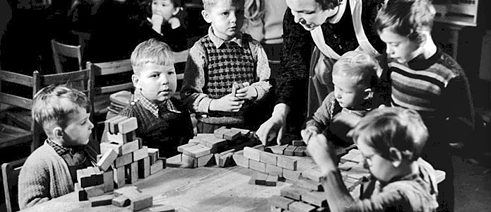The Trauma of War
Inherited Memories

The after-effects of the Second World War are still felt by many families today, even into the second and third generation. The journalist Sabine Bode attributes the insecurity felt by the children and grandchildren of those who lived during the war to the failure of their parents and grandparents to properly work through and come to terms with their experiences.
Ms Bode, your books explore how the experiences of Germans in the Second World War have affected subsequent generations. Why should the lives of our parents’ and grandparents’ generation interest us in the first place?
Our ancestors are important. They influence our behaviour, even though we may often be unaware of this. If we know our ancestors and engage with who they were and what they experienced, this gives us a sense of security. This is something that is acknowledged in other cultures to a far greater extent than in Germany. The experiences of the Second World War in Germany often resulted in people being reluctant to address the past and the trauma that they incurred at the time. Yet in this context such experiences – especially those of children who grew up during the war – are still having after-effects to this day.
In what sense?
This has something to do with the things that people – especially children – experienced during the war. Bombing, hunger, deportation and displacement, death of family members, experiences of violence. Situations in which one feels completely powerless and at the mercy of circumstances. Such experiences can give rise to trauma if not worked through properly. And that was very often the case after the war. People were simply happy that it was over, and wanted to look ahead to the future. School started up again, children stopped crying and their parents told them that they should be glad to be alive. They had no desire to get to grips with what they had experienced, and therefore neglected to work through their trauma – and today their children are suffering as a result.
How do you define this generation, the children of those who lived during the war?
They are the ones whose parents were born while the war was still ongoing. For the most part, they themselves were born in the 1960s and 1970s, though they could also have been born in the 1950s or 1980s – so long as their parents were born by 1945. Many of those who were still children during wartime no longer remember what happened, and frequently do not even realize that they may be traumatized. Research indicates that a third have not recovered from the horrors they experienced in their early years.
Putting their own needs on hold
What are the effects of such unprocessed trauma?Traumatized people find it very difficult to stand any sense of helplessness, as this is what caused their trauma in the first place. Yet there is hardly anything more helpless than a baby. Although a traumatized mother will care properly for her child – feeding and bathing it and changing its nappy – she will withdraw emotionally from the child when she senses its helplessness. This produces abandonment fears in the child. From a very early age, the child will therefore do everything in its power to make its mother happy, tending to put its own needs on hold. This reverses the relationship between mother and child in an unfavourable manner. Psychologists term this parentification.
What consequences does this have in the later lives of the “third generation”?
Traumatized adults who were children during the war tend not to be capable of properly comforting their own children. They simply pacify them, saying: “You don’t need to be scared. There’s nothing there.” But they do not take the child into their arms and hold it until it has calmed down. In the third generation, this often gives rise to a strong sense of insecurity. Such children also often feel responsible for their parents in a way that does them no good, and as a result find that their parents continue to treat them as children to a huge extent even well into adult age.
How do family secrets affect relationships between family members? And what role do they play when it comes to trauma?
They can likewise result in a deep sense of insecurity and a lack of trust in the future. They tend to be caused by something known as “culpable involvement”. This would be the case for instance if one’s grandfather had been in the SS, or if a family member had been violent towards or had wronged another person in order to gain an advantage for himself or herself. Subsequently the subject is never discussed – either because no words can be found to describe the horror, or because no-one wants to be reminded of it. The memories are not passed on as they should be in a family, and one loses contact with one’s forebears. This makes one feel insecure.
Children sense when something is wrong
In your books, you conclude that these secrets have a powerful impact on subsequent generations.Children have a very sure sense of what is happening, and of when something is wrong. At the same time, they are easily controllable, so if they are told that they are imagining everything, that there is nothing to worry about and that they should not ask such strange questions, they will comply. Children do not want to be thought strange, they want to belong. So they learn to subtly ignore the facts and begin to believe that they cannot trust their own instincts. This can later result in a lack of knowledge of human nature. In families that have been displaced, this is also compounded in many cases by a pronounced distrust of all strangers.